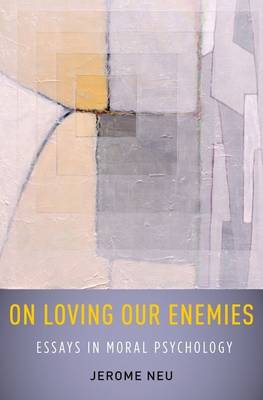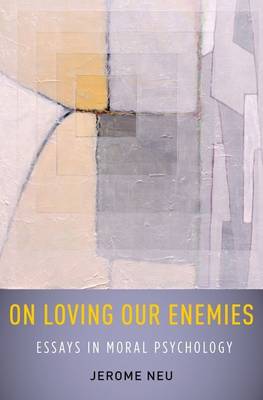
- Afhalen na 1 uur in een winkel met voorraad
- Gratis thuislevering in België vanaf € 30
- Ruim aanbod met 7 miljoen producten
- Afhalen na 1 uur in een winkel met voorraad
- Gratis thuislevering in België vanaf € 30
- Ruim aanbod met 7 miljoen producten
Zoeken
€ 132,95
+ 265 punten
Omschrijving
This book explores moral questions that go beyond the issues commonly considered in the ethics of action. Can there be an ethics of emotion or an ethics of fantasy? If what we feel and what we think are beyond the direct control of our will, does it make sense to set norms or standards for us to aim at in those spheres, or does anything go? What are the limits of our freedom? And what are the sources of our standards? Are they themselves a matter of arbitrary feeling or do there exist authorities we might turn to in order to find our way? We are told that authenticity is valuable, that we must be true to ourselves. Is the self and what it wants the ultimate source of value? (Even the nastier parts of our natures?) How are we to determine which aspects of ourselves are essential and demand and deserve expression? Are there competing and conflicting sources of value? The claims of Plato, Freud, Sartre and other important thinkers are considered, criticized, and brought into play in
the service of greater self-understanding and understanding of what matters and what is up to us. Throughout, the insights and approaches of law, psychoanalysis, anthropology, and other disciplines in addition to philosophy are put to use. The essays included in this collection draw on and develop the author's earlier work on emotions and moral identity in the Spinozist hope that greater self-understanding, because of the special features of reflexive-knowledge, can lead to greater freedom, making us better able to live with others and with ourselves. "Philosophy of emotion and Freudian theory are now thriving areas of philosophy, but they were not when Neu began; he was instrumental in making them so. His essays on emotion, particularly the classic papers on jealousy, helped pave the way for the rehabilitation of emotion that has transformed moral philosophy. There is every reason to believe, then, that the present collection will stand as a significant contribution to scholarship on Freud, Emotion, and Morality." - John Doris, Philosophy, Washington University in St. Louis "Jerome Neu is one of the most insightful contemporary writers on the philosophy of emotions. His first essay collection, A Tear is an Intellectual Thing, was a major contribution to our thinking about the nature of emotions (in general and with respect to particular emotions) and their important implications in the actual texture of our moral lives. This essay collection is a worthy successor and provides a rich analysis of particular emotions (love, for example), an exploration of the relationship between emotions and authenticity and freedom, enlightening discussions of Freud and his critics, and the role of emotions in the law." - Jeffrie G. Murphy, Law, Philosophy, and Religious Studies, Arizona State University
the service of greater self-understanding and understanding of what matters and what is up to us. Throughout, the insights and approaches of law, psychoanalysis, anthropology, and other disciplines in addition to philosophy are put to use. The essays included in this collection draw on and develop the author's earlier work on emotions and moral identity in the Spinozist hope that greater self-understanding, because of the special features of reflexive-knowledge, can lead to greater freedom, making us better able to live with others and with ourselves. "Philosophy of emotion and Freudian theory are now thriving areas of philosophy, but they were not when Neu began; he was instrumental in making them so. His essays on emotion, particularly the classic papers on jealousy, helped pave the way for the rehabilitation of emotion that has transformed moral philosophy. There is every reason to believe, then, that the present collection will stand as a significant contribution to scholarship on Freud, Emotion, and Morality." - John Doris, Philosophy, Washington University in St. Louis "Jerome Neu is one of the most insightful contemporary writers on the philosophy of emotions. His first essay collection, A Tear is an Intellectual Thing, was a major contribution to our thinking about the nature of emotions (in general and with respect to particular emotions) and their important implications in the actual texture of our moral lives. This essay collection is a worthy successor and provides a rich analysis of particular emotions (love, for example), an exploration of the relationship between emotions and authenticity and freedom, enlightening discussions of Freud and his critics, and the role of emotions in the law." - Jeffrie G. Murphy, Law, Philosophy, and Religious Studies, Arizona State University
Specificaties
Betrokkenen
- Auteur(s):
- Uitgeverij:
Inhoud
- Aantal bladzijden:
- 272
- Taal:
- Engels
Eigenschappen
- Productcode (EAN):
- 9780199862986
- Verschijningsdatum:
- 30/05/2012
- Uitvoering:
- Hardcover
- Formaat:
- Genaaid
- Afmetingen:
- 236 mm x 165 mm
- Gewicht:
- 544 g

Alleen bij Standaard Boekhandel
+ 265 punten op je klantenkaart van Standaard Boekhandel
Beoordelingen
We publiceren alleen reviews die voldoen aan de voorwaarden voor reviews. Bekijk onze voorwaarden voor reviews.











